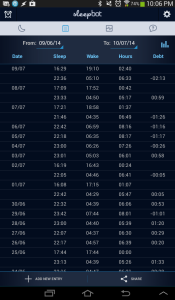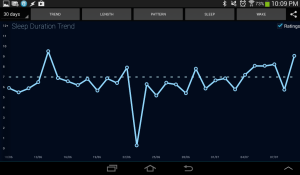I have always struggled with getting enough rest, for as long as I can remember. Through my college years, I would stay awake for days (usually playing ping-pong and video games) and then binge sleep on the weekends (and some Mondays). I never really thought anything of it.
A few years back, I took a job working at a hospital in New Orleans. I had the joy of working the weekend night shift, which meant I worked 7pm to 7am, Saturday and Sunday night, every week. I would get off of work Monday morning when the day crew would come in at 7am. I was alone the whole time. Sometimes late at night I would walk up to the ICU ward and listen to the breathing machines and monitors, just to stay awake. Sometimes I would go up to the NeoNatal unit to watch preemies in incubators. Sometimes I was so tired, I would hallucinate, and fall asleep sitting at my desk, perched on a tall chair. Sometimes between 4am and 5am I would pass out on the floor, with my backpack as a pillow, and sleep for 30 minutes because I couldn’t hold my eyes open.
To make things worse, I had to come in for two 8-hour day shifts on Wednesdays and Thursdays, every week. After six months, my body still hadn’t adjusted. I was either working, sleeping, or staring into space like a zombie. For six straight months.
Somewhere during that time, I realized that I couldn’t function without sleep. That’s also when I started drinking coffee to be able to function (and it’s been ten years, I still haven’t broken that addiction! LOL). Eventually, I quit that job because I couldn’t function. Things went back to normal- for a while.
Fast forward a few years. Now I’m working a job I love. I’m eating right, exercising, doing everything right. And yet, I don’t get enough sleep. How much is considered enough? How much does a normal person need to function properly? Would you even know what functioning properly would feel like??
The truth is, you can function on limited sleep. I’ve done it for decades. The problem is, you can’t function to your full capacity. Most people will never know what their full mental capacity is capable of because they’re crippled from lack of rest. It’s been reported that before the invention of the light bulb, people slept an average of 10 hours a night. Today, adults sleep an average of 6.9 hours a night. Our bodies (and brains) weren’t made to function through the night. Yet today, it’s rare for people to go to bed when the sun goes down.
How do you fix this? It has to be addressed in a structured, logical manner. You need to figure out how much sleep you require (which varies from person to person) and then make a plan to get that much sleep every day. Some people need 8, some people need 9 hours, some people need 6 or less (though I can’t imagine your body functioning correctly on less than 6).
How do you figure out how much sleep you need? You need to have a way to track when you’re sleeping, record your sleep patterns, and see what the quality of your sleep is. There are numerous ways to do this, many of which are technology based. The Fitbit Flex, Jawbone, and others will let you chart your sleep habits, so you can see exactly what your body is doing. I use a free app called SleepBot that works with your smartphone. It not only records your sleep times, it also records sound and movement using your phone’s sensors. You can hear yourself snoring and tossing! Pretty eye-opening stuff (no pun intended).
You’ll need to spend a few weeks in your normal routine, recording your sleep habits, before you can come up with a plan. Take this information and apply it! Sleep more, and record how you feel in a journal (SleepBot lets you do this inside the app). You can then improve your quality of life with a simple plan. Get as much rest as you need.
Here’s a sampling of the data I get from SleepBot:
Here, you can see I get between 5.5 and 6.5 hours of sleep a night, plus a nap on some days.
The dotted line is where I set my daily goal, at 7 hours. (You can see one day I forgot to log!) But I’m happy to see over a month my sleep patterns are getting slightly better. Over time, I’ll have more data, but this is encouraging. My plan is working.
I’ll leave you with a few links to read up on the benefits of sleep:
Fierce Gentleman: The Power Of Rest
National Sleep Foundation: How Much Sleep Do We Really Need?




Hey, Just read this Jeff. Truly and eye opening post. Well thought out and put together. I know your plight. My career field puts me on call many nights of the week. Sometimes while on this call status I am traveling on the road the whole night. But in the morning my “day job” portion of my career begins and I must function as if I have had a full nights rest through out the day. Regardless of what the night before gave me in terms of sleep. When you couple this “professional requirement” with trying to raise and support a family, most nights it is nearly 10pm before the house is quiet, the kids asleep and I can slow down from the warp speed that seems to by my day.
People would get more sleep in the past because at night there was no way or reason to continue with “your day”. You couldn’t. It was too dark to do “day things”. But as we have gained technologies and computers, and artificial light we now can work nearly around the clock. And for the most part we do. We are “stimulated” all throughout the day. With work, family, personal time; all of this has slowly crept into the part of our lives that we should have reserved for sleep. In a since it is an addiction to stimulation that keeps us awake. We know we need more sleep. Every morning when that alarm wakes me up I play the game of pleading with my mind and body, “Come on. Get up. Tonight I will go to bed earlier.” But the “can’t shake feeling” of sleep deprivation slowly wears off as you ready yourself for the day. At work you feel the exhaustion and convince yourself, “Stay awake, when I get home I will nap”. But when you step through the doors you get lost in the webs of time while you manage your obligations of being a good spouse and parents to your children.
We keep ourselves busy in today’s time and age. We think we needs more gadgets to help us work better, and more things to help us relax. The TV, the DVR, and this “relaxation”. But it’s all stimulation. Night used to be a time to wind down. But we now have so much over stimulation we are exhausted and what little time we give ourselves to sleep is spent tossing and turning in bed. It’s a viscous cycle; but we must learn to stop. To simply force ourselves at a certain time to put away the PC, the TV, and “the noise”, collect our family and kids in one room, read that book as a family, say our prayers, slow down and go to bed.
Thanks Jeff again for such a moving and thought provoking post. As the Wall-O-Text above attest to; it got me thinking.
God Bless!
BTW, I forgot about the coffee. Nothing like a good hot cup of it in the morning. Lightly sweetened. Nectar of the the gods! lol
Kevin! Thank you so much, brother! I definitely agree about our lives being too stimulated, and I’m no exception. The internet has brought all kinds of good things into my life, but at the same time, it has brought in a lot of unnecessary things as well. I’m slowly learning to get a handle on it, but it’s a constant struggle. Some weeks are better than others.